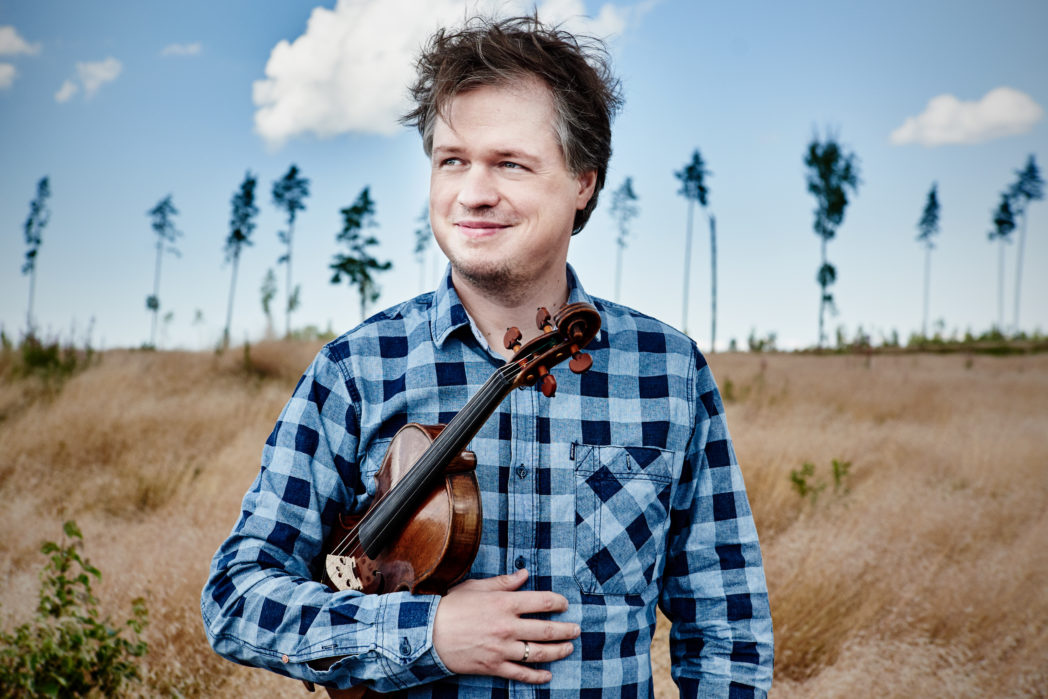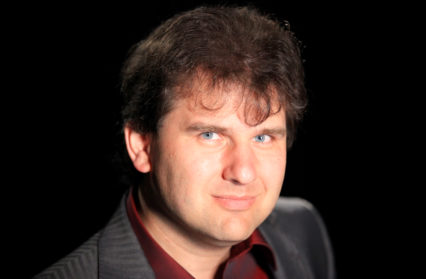Nigel Jarrett is at St. David’s Hall in Cardiff to review a performance by the Orchestra of the Welsh National Opera conducted by Tomáš Hanus and featuring soloist Henning Kraggerud.
Each foreign appointee to the role of Welsh National Opera’s music director, if he (it’s always been a he) doesn’t already speak much English, soon enough has a go at doing it in public. Italian Carlo Rizzi, who has twice returned to the company as MD and is now Conductor Laureate, even learned Welsh proficiently enough to be interviewed in the language on television. The present incumbent, Brno-born Tomáš Hanus, took the opportunity to address the audience at this concert, the latest in the Hall’s International Series, not just to talk about the music but to emphasise its Czech connections.
The concert was dedicated to the memory of his compatriot Jiří Bělohlávek, formerly chief conductor of the Czech Philharmonic Orchestra and the BBC Symphony Orchestra, who died last year of cancer. Bělohlávek’s widow, Anna, was in the audience. Taking his cue from the monicker of Dvořák’s Ninth Symphony (‘From the New World’), Hanus remarked on the freshly-minted nature of all the music about to be played.
The Orchestra of WNO always performs outside the pit with an unmistakeable sense of drama and theatre, and that’s not a self-fulfilling prophecy on the part of audiences and critics. There’s always fire in its belly. The symphony’s sense of an unfolding landscape with an interlude of longing for a homeland, a Czech one, found Hanus and his players chomping at the bit and creating a sound not a little connected with the way he arranges the orchestra, with double-basses strung along the elevated back tier, cellos centrally placed on a level directly in front of him, and timps and percussion to the right behind the violas: each conductor to his own in a hall accommodating every sonic variation.

That the orchestra knows quietude as well as loud exuberance was crystallised in the famous second movement, its cor anglais solo over muted strings given out plaintively by Lucie Sprague, clearly making its mark as much as timpanist Patrick King with Angus West’s contingent of horns in the explosion at the opening of the first movement, which romped into its allegro and throughout was a statement of the intention to operate on a broad canvas. The third movement scherzo was buoyant and graceful, the final fast one not so inflammatory as to obscure the transition by the clarinets of Leslie Craven and Daniel Rye into the second subject and its recalling of elements from the first three movements. This was home territory for Hanus, and it was traversed with proprietorial zeal and tenderness.
Mendelssohn’s Violin Concerto in E Minor is ‘new’ in the idea of music sounding as though it was composed the day before. It’s connection with the symphony lies in the composer’s sojourn in another country – England – in the year the concerto was expected to be completed. The British have always loved Mendelssohn the tunesmith, though the devotion says a lot more about musical taste in Britain than a devotion to charming romanticism, in which Mendelssohn excelled. In few other staples of the repertory does the solo instrument of the concerto sound as though it has been consensually pushed forward by the rest of the band to be first among equals.

It takes a musician as sympathetic and unassuming as the Norwegian Henning Kraggerud to make that arrangement meaningful. With eyes fixed almost continuously on the conductor, his easy bravura and lack of over-confident assertion melted everywhere into a longer performance than one is used to, despite Hanus’s lively tempos here and there. This was true of the first movement cadenza, effectively staunching the flow until the first violins and woodwind, in perfect pianissimo, brought back the principal material while the soloist went about his arpeggiated business.
There was more warmth and affection in the second movement, quickly brought on by Hanus to staunch misplaced applause, and a lively return to Mendelssohnian high spirits in the third. Here, not the least of Kraggerud’s attention to detail lay in the interplay between violin and orchestra that justified a coda of undiminished brilliance, though in keeping with what went before, not of the scene-stealing kind. There were times, though, when the soloist might have taken his equivalence with the orchestra less literally and gone for broke. First is first, after all, whether among equals or not.

One of the regrets of music is that Beethoven composed only one opera, for many the greatest of them all. That he was, like Verdi in his various guises, a man of the theatre is illustrated nowhere more compellingly among his concert stand-alones than in the overture to Egmont. It’s the epitome of things to come, except that they don’t in a concert, not even as a recollection for most of the audience of the details of Goethe’s eponymous drama about a Dutchman trying to wrest his country from Spain’s control, particularly from the Spanish counterpart of Napoleon.
It would have made an excellent Beethoven opera, complete with a final scaffold scene in which our hero meets his end. Heroism, freedom, and fortitude: Beethovenian staples. Hanus’s was almost a literally stirring performance in which the elements of the story were agitated to form a conflation of themes permeated throughout by high expectation and topped with a climax prefiguring the end. But it was not so much the end as the end of the beginning. It’s what this orchestra does every time it plays abscondo beneath the stage.
It would be churlish to ascribe the big audience attracted by this concert to anything other than its popular programme; but the timing, 3pm on a Sunday afternoon, might be a pointer to other concert promoters seeking to attract weekend punters deterred by the prospect of the latest of late finishes.
St. David’s Hall, Cardiff, 14 January 2018
Orchestra Of Welsh National Opera
Soloist: Henning Kraggerud (violin)
Conductor: Tomáš Hanus
Beethoven: Overture: Egmont
Mendelssohn: Violin Concerto in E minor
Dvořák: Symphony No. 9 in E minor
Header photo of Tomáš Hanus, courtesy http://tomashanus.com
Nigel Jarrett is a freelance writer and regular contributor to the Wales Arts Review. He is a poet, novelist, and story writer. His latest collection of stories, Who Killed Emil Kreisler?, was published in 2016. He is a winner of the Rhys Davies prize for short fiction and the inaugural Templar Shorts award. He also writes and reviews for Jazz Journal and Acumen poetry magazine. This year sees the publication of his short fiction pamphlet, A Gloucester Trilogy.



 Enjoyed this article? Support our writers directly by buying them a coffee and clicking this link.
Enjoyed this article? Support our writers directly by buying them a coffee and clicking this link.







